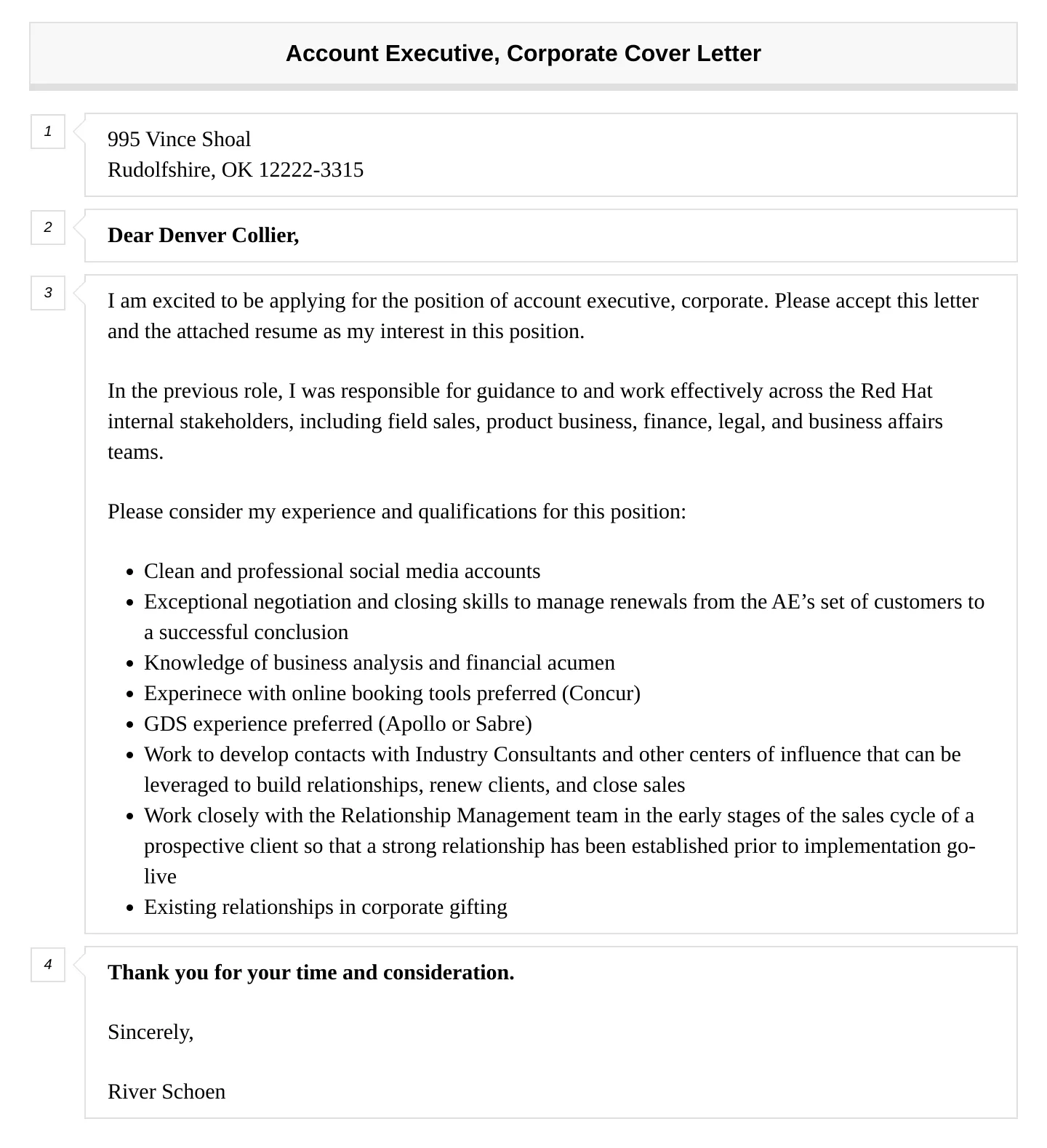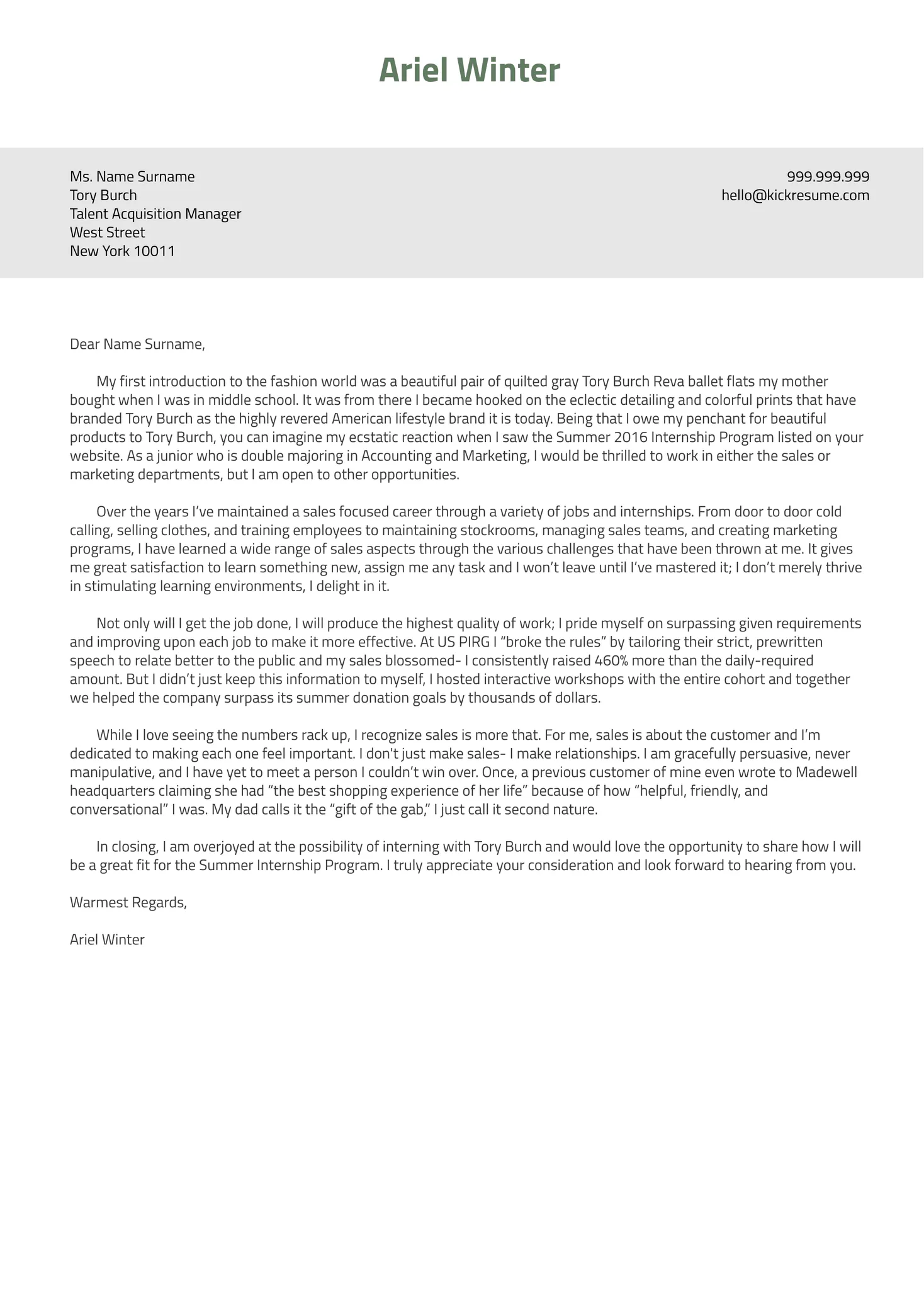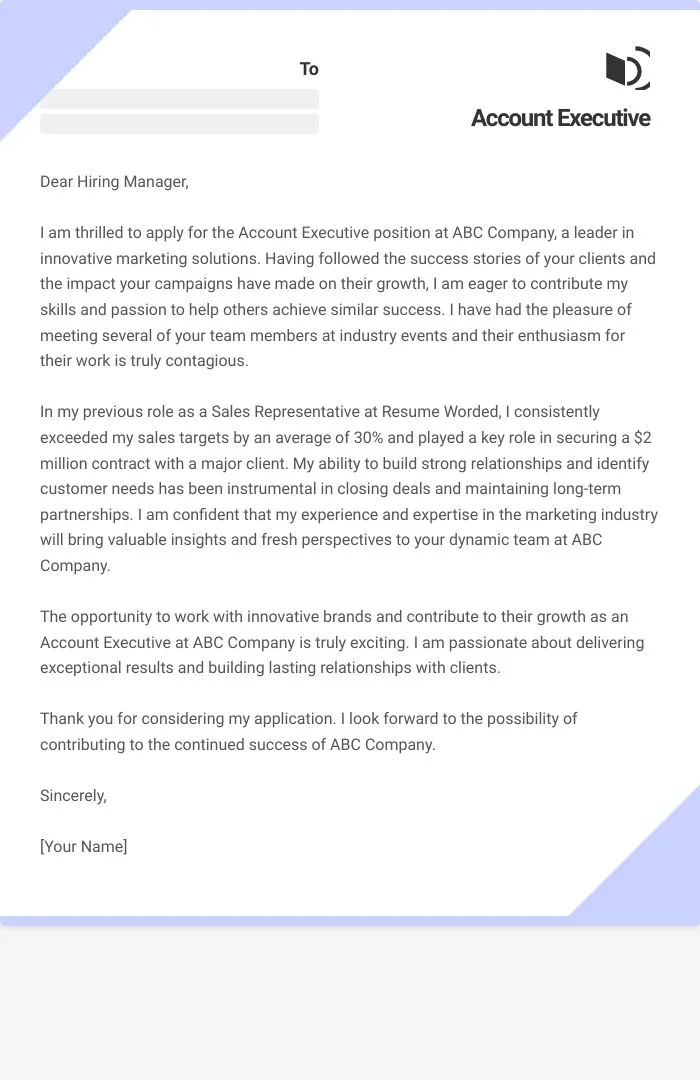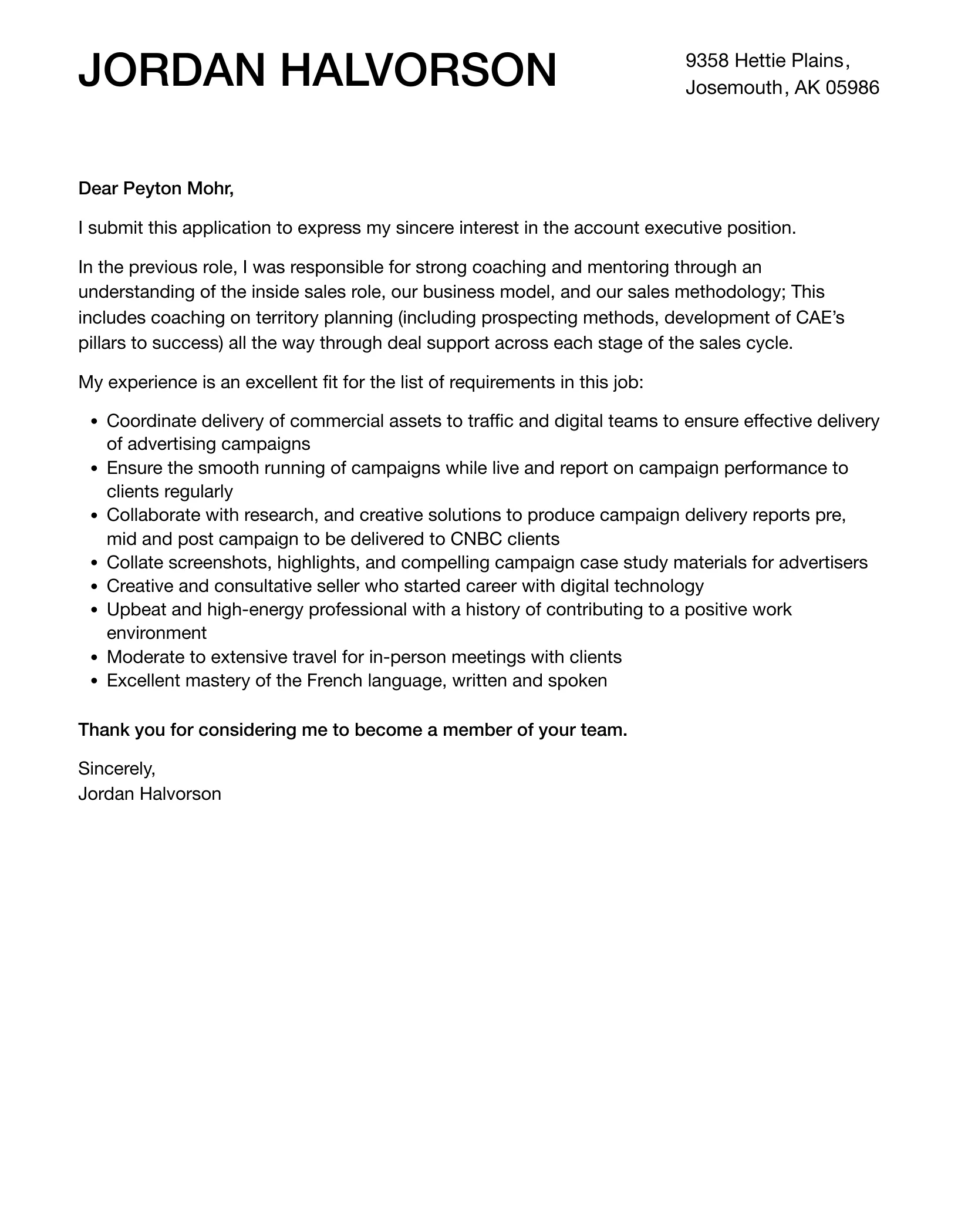Why a Great Account Executive Cover Letter Matters
In the competitive world of account executive roles, a compelling cover letter can be your golden ticket to securing an interview. While your resume provides a snapshot of your experience, your cover letter allows you to tell a story, connecting your skills and accomplishments to the specific needs of the employer. It is an opportunity to demonstrate your personality, passion for the role, and understanding of the company’s goals. Many applicants often overlook the importance of a well-crafted cover letter, but it’s your chance to stand out from the crowd and make a memorable first impression. A strong cover letter can elevate your application, making you more than just a list of qualifications; you become a person, a problem-solver, and a potential asset to the team. This is particularly crucial in account executive positions, which often require strong communication and persuasive abilities. So, invest the time to create a cover letter that is tailored, engaging, and impactful.
Highlighting Your Account Executive Skills
Account executives require a diverse set of skills to excel in their roles. Your cover letter should spotlight these abilities to show how you’re a great fit for the position. Focus on the skills that are most relevant to the job description. Start by highlighting your sales and business development experience, emphasizing your ability to identify new opportunities, generate leads, and close deals. Then, move on to showcase your client relationship management skills, detailing your experience in building and maintaining strong, long-term relationships with clients. Finally, don’t forget to mention your communication and interpersonal skills. This includes the ability to effectively communicate with clients, resolve conflicts, and collaborate with internal teams. By demonstrating these skills, you show the hiring manager that you possess the necessary tools to be successful as an account executive.
Sales and Business Development Prowess

In a cover letter for an account executive position, it’s crucial to highlight your sales and business development skills. Provide specific examples of your achievements in these areas. Instead of simply stating you have sales experience, mention the specific strategies you’ve used to generate leads and increase revenue. For example, describe how you implemented a new sales process that led to a 20% increase in sales within a quarter. If you have experience in business development, outline how you identified and pursued new market opportunities, or how you created partnerships that expanded the company’s reach. Remember to include metrics and quantifiable results to demonstrate your impact. Mentioning your ability to manage a sales pipeline, negotiate contracts, and close deals demonstrates your capabilities to handle the responsibilities associated with an account executive role.
Client Relationship Management
Client relationship management is a cornerstone of the account executive role, therefore, your cover letter should strongly emphasize your abilities in this area. Explain your approach to building and maintaining relationships with clients. For example, describe how you proactively communicate with clients, understand their needs, and offer solutions that exceed their expectations. Provide specific instances where you successfully managed client relationships that resulted in increased customer satisfaction, retention, or upselling opportunities. You could mention your experience in handling client issues, resolving conflicts, and ensuring client loyalty. Highlight your ability to anticipate client needs and provide personalized service, which can significantly contribute to long-term client relationships. Your goal is to portray yourself as someone who not only understands but also excels in building and nurturing strong client partnerships.
Communication and Interpersonal Skills
Account executives must possess excellent communication and interpersonal skills. Your cover letter should showcase your ability to communicate effectively, both verbally and in writing. Provide instances where you have successfully presented to clients, negotiated contracts, or resolved conflicts through clear and concise communication. Mention your experience in active listening, understanding client needs, and responding appropriately. In terms of interpersonal skills, highlight your ability to build rapport, collaborate with internal teams, and work effectively in a team environment. Demonstrate your adaptability and flexibility, showing that you can handle various personalities and situations. Consider adding a sentence or two about your ability to navigate complex situations with tact and diplomacy, which can significantly enhance your value as an account executive.
Quantifying Achievements in Your Cover Letter

One of the most effective ways to make your cover letter stand out is by quantifying your achievements. Instead of making general statements about your success, use numbers to demonstrate your impact. When describing your sales performance, mention the percentage by which you exceeded sales targets or the total revenue you generated. If you improved client retention rates, state the specific percentage increase. When discussing your ability to close deals, specify the average deal size or the number of deals you closed in a given period. Highlighting specific metrics not only showcases your accomplishments but also provides concrete evidence of your capabilities. Including quantifiable results adds credibility to your claims and demonstrates your ability to deliver tangible results in the account executive role. This data is far more convincing than vague descriptions. Therefore, always strive to include measurable data in your cover letter to impress the hiring manager.
Metrics to Showcase Your Success
To effectively showcase your success, include key metrics in your cover letter. Focus on metrics that are most relevant to the account executive role, such as sales figures. Mention the total revenue you generated, the percentage increase in sales you achieved over a specific period, or the number of deals you closed. Client retention rates are also key, so include the percentage of clients you successfully retained. If you have experience in client satisfaction, mention any improvements you made in satisfaction scores. Consider showcasing upselling and cross-selling success by mentioning the percentage increase in revenue generated through these strategies. Other metrics to consider are lead generation numbers, the conversion rate of leads to clients, and the number of new clients you acquired. Including these metrics will provide the hiring manager with concrete evidence of your ability to achieve results.
Tailoring Your Cover Letter for the Role
A generic cover letter is unlikely to make a strong impression. To increase your chances of success, it is vital to tailor your cover letter to each specific role you apply for. Begin by carefully reviewing the job description and identifying the key requirements and skills that the employer is seeking. Then, align your skills and experiences with these requirements. Highlight the aspects of your background that are most relevant to the role and use the same keywords and phrases that are used in the job description. Demonstrate that you understand the company’s goals and how your skills can help them achieve these objectives. Researching the company beforehand helps you to customize your letter, showing that you are genuinely interested in the position. This personalized approach shows employers that you are serious about the opportunity and that you have taken the time to understand their needs.
Researching the Company and Position

Thoroughly researching the company and the specific account executive position is crucial when writing your cover letter. Visit the company website, explore their services, and review their mission and values. Understand the company’s target market, competitive landscape, and recent achievements. This information will help you tailor your cover letter, demonstrating that you understand the company’s goals and how your skills can contribute to their success. Also, research the specific position, paying close attention to the responsibilities and requirements outlined in the job description. Identify the key skills and experiences that the employer is seeking and highlight how your background aligns with these requirements. If possible, research the hiring manager or team you would be working with. Showing a genuine interest in the company and the role will greatly increase your chances of landing an interview.
Formatting and Tone of Your Cover Letter
The formatting and tone of your cover letter are important in making a positive impression. Your cover letter should be professional, well-organized, and easy to read. Use a clear and concise font, such as Arial or Times New Roman, with appropriate spacing and margins. Use headings and bullet points to break up long paragraphs and make the content more readable. Address the hiring manager by name, if possible. The tone of your cover letter should be professional, yet engaging. Show enthusiasm for the opportunity and demonstrate your personality. However, avoid being overly casual or using slang. Keep the language positive and optimistic, focusing on your strengths and accomplishments. Proofread your cover letter carefully for any grammatical errors or typos. A well-formatted and polished cover letter demonstrates your attention to detail and professionalism.
Call to Action How to Get the Interview
Concluding your cover letter with a strong call to action is essential to encourage the hiring manager to contact you. After highlighting your skills and experience, express your enthusiasm for the opportunity and state your interest in discussing your qualifications further. Mention your availability for an interview and provide your contact information, including your phone number and email address. Reiterate your appreciation for their time and consideration. Make it easy for the hiring manager to reach out to you by including a clear and concise call to action. For example, you could say, ‘I am eager to learn more about this opportunity and discuss how my skills can benefit your team. I am available for an interview at your earliest convenience and can be reached at [phone number] or [email address]. Thank you for your time and consideration.’ This final step reinforces your interest and makes it simple for the hiring manager to take the next step and invite you for an interview.
